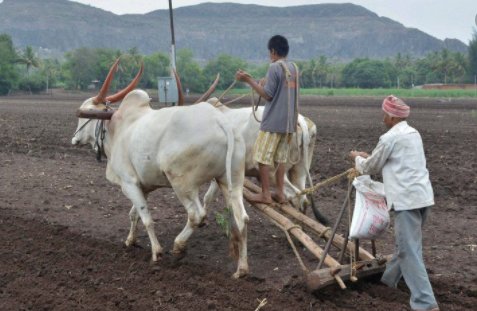Bharat Jhunjhunwala
The government has provided that sale of agricultural produce through the mandis will no longer be compulsory. Large companies will be able to enter into direct contracts with farmers to buy their produce at predetermined prices. Certainly, this will hit at the interests of the traders who make a living in the mandis.
However, the situation is similar to the entry of e-portals in retail trade. The street-corner kirana shops continue to survive because they provide certain services such as immediate delivery and replacement that e-traders are not able to provide. In the same manner, the entry of large companies in agricultural trade will not kill the mandis. The mandis provide a highly valuable service of sorting the farmer’s produce in different qualities and then selling that crop to a particular buyer. A trader may, for example, buy tomatoes produced in Alwar and supply them to Kanpur. Such a service cannot be provided by the e-traders. Hence, mandis will survive. Farmers have a right to enter into direct contracts with large companies and their freedom to do so must be preserved.
The government has also removed certain crops like cereals, pulses and edible oils from the items covered under the Essential Commodities Act. This Act places limits on the maximum quantities of specified items that can be stored by traders. With this change, the traders will be able to store as much quantities of these crops as they may want. This measure can have some negative impact. These crops were brought into the act because big traders bought the produce, hoarded it, created an artificial shortage in the market and induced a huge price increase.
Both the farmers and the consumers suffered in the process. The farmer got a low price prevailing at the time of the purchase. The consumer paid the manipulated high price at the time of the sale. The government had brought these crops under the Act to prevent such manipulation of the market. At the same time, the storage of crops by private traders is much more efficient than the Food Corporation of India (FCI). The way forward is to make it compulsory for the traders to disclose the quantity of crops stored by them.
Simultaneously, the government must direct the FCI to import crops that the traders may be hoarding. The FCI can make forward contracts or outsource the storage of the relatively small quantities involved. In this way, the government can stabilize the price and the country will also become free from the inefficiencies of the FCI in bulk storage.
There is a need to go farther, however. The Minimum Support Price (MSP) is provided to select crops such as wheat, rice and sugarcane. Our farmers have increased the production of these crops because they are assured of a decent price. This success has shifted the farmer’s attention away from other crops that could provide higher returns such as vegetables, fruits, timber, flower and orchids because of uncertainty of price in these unsupported crops. We need to move the farmers from low-value MSP crops to high-value market-oriented crops. In particular, it is important to support crops that have a huge international demand such as flowers, organic foods and designer vegetables.
We have a varied climate from Kerala to Kashmir. It is possible for us to become a global flower and vegetable hub and supply these items across the year. The government must work out a system to cover the risk of the farmers in cultivation of market-based crops. A subsidized insurance system which covers against price decline would be one option.
The government is trying to reduce agricultural subsidies of food, fertilizers, water and diesel. The need is to turn these subsidies towards areas that lead to a multiplier effect. For example, instead of subsidizing electricity for extracting ground water, the same money can be better utilised in providing subsidy for water recharging by building check dams, ponds and anicuts.
Public investment in agriculture also needs a close study. Mere building of more canals and increasing area under irrigation will not help because the prices of agricultural crops are declining if we take the inflation into account. Public investment must be fine-tuned to support value-added agriculture. For example, the global demand for organic foods – guavas, mangoes, coffee and tea – is increasing. The government must create a certification mechanism in each district to promote this. Export subsidy may be provided to private exporters of value-added agricultural crops.
We have been asking for the dismantling of domestic agricultural subsidies by the rich countries under the WTO. The idea is that opening of the markets of rich countries will provide opportunities for our farmers. The resulting increase in supply from other producers can wipe out the gains for us. For example, the entry of Vietnam in coffee and black pepper has wiped out the gains for Indian farmers from free trade in these crops. We should consider an altogether different policy. We must make cartels for specific agricultural commodities just as OPEC has done for oil. India can join hands with Malaysia to increase the world price of rubber; with Bangladesh for jute, with Sri Lanka for tea and Pakistan and Egypt for cotton. This will provide high prices to our farmers. But we may have to come out of the WTO in the process which we must consider seriously.
The government is trying to increase the flow of credit to the farmers under the impression that lower interest rates will provide relief to them. No relief is likely to be got, however. The rural areas are flush with funds. The credit-deposit ratio of rural banks is typically 15. The loan given out is only `15 for every `100 of deposits garnered by the rural banks. Thus, rural banks have plentiful deposits but few applicants for loans. Farmers have the money but no opportunity to deploy it productively because of absence of profitable opportunities in villages.
Expansion of credit will serve no purpose in this situation. It is like pouring tap water into the waterfall. The government must instead focus on promoting specific areas such as floriculture where the profits are high. Need is to make fundamental shifts in the policies.
The writer is a former professor of IIM, Bangalore.






































